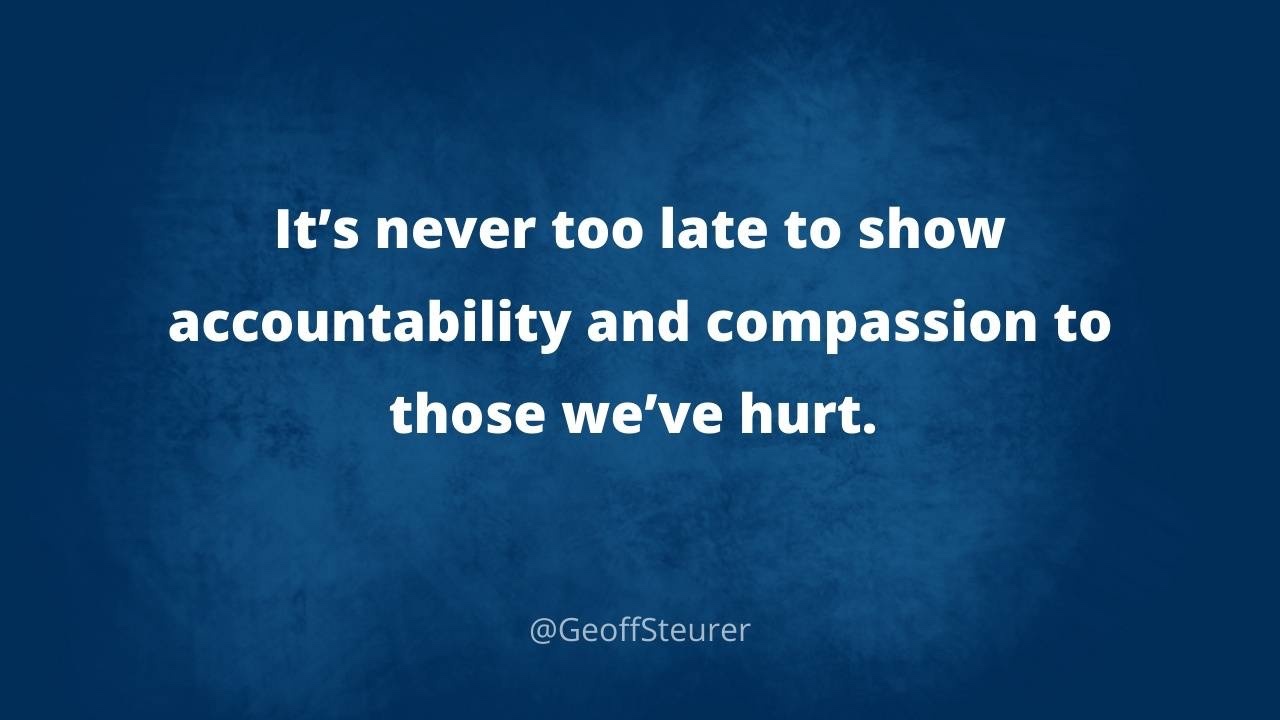
Q&A with Geoff: How do I re-engage with my son who won’t speak to me?
Question
My husband and I raised our children in a Christian home where we instilled strong family values. As in all families, there were times when situations were not handled well. There was family conflict that was hurtful. I often felt like I needed to protect my children from my husband’s tendency to act in anger. I’m sure that this had a negative effect on all my children.
As time went on our sons chose to leave our Christian faith. I honored their choice, though sometimes it was hurtful and hard to understand. Still, I felt that I had good relationships with each of them. They have always respected my commitment to my faith. We all live in different states and visiting is infrequent due to our geographical distances.
This makes it difficult to be physically present with them as often as I would like.
Recently one of the sons has pulled away from phone communications with me and in questioning him further about this change related that he feels the need to withdraw from me until he can heal from past hurts.
During this communication, he used the term that he felt he was raised in an environment of “toxic positivity.” I have not heard the term before and was puzzled as to what he meant.
I would appreciate your take on this term, what it means and how it affects relationships within the family. I would also appreciate some direction on how to go forward in communicating with this son whom I love and wish to always have in my life.
Answer
It’s confusing and deeply painful to have a child suddenly stop talking to you without much explanation. Of course, it’s natural to scan through every interaction and wonder if there was some errant word or action that caused the divide. I realize it’s easy for me to encourage you to be patient with him as he figures out what he needs to heal.
However, I recognize that this is agonizing for you as you search for answers. He has given you a small clue about his pain, so let’s take a look at that and answer your question. Because I know nothing about your family or the interactions that you had in your home while your son was growing up, I’m going to make some guesses based on the information you shared.
In my experience, when there is a parenting dynamic where one parent is trying to protect their children from the other parent’s negative treatment, the protective parent can unintentionally dismiss the emotions and experiences of the children in an attempt to keep the peace.
For example, there may have been times when your husband was verbally or physically aggressive with your son, and, instead of expecting your husband to be accountable and repair the damage he did to his son, you may have made excuses for your husband’s behavior.
You may have tried to explain to your son that his dad had a bad day or justified that at least he has a nice home to live in, or countless other reasons that suggest he should not feel hurt by what happened. Again, this is just one example, but you can hopefully understand the idea of what I’m sharing.
If you did not feel like you could work with your husband as a co-parent and help influence him to be a healthy father, you may have tried to keep things positive and upbeat in the home even though you felt powerless. While there is nothing wrong with positivity, it cannot be used to bypass accountability or acknowledge real pain.
The concept of “toxic positivity” simply means that there is ongoing dismissal of feelings and experiences that needed to be addressed. Another example of this is often what happens after someone passes away. Many of the comments that are passed along are attempts to cheer up the bereaved, but they simply aren’t helpful.
They bypass the reality of the grief and the complexities of life in the wake of losing a loved one.
Toxic positivity is more about managing your own discomfort by trying to only focus on the good rather than sitting with the other person’s emotional or physical discomfort. You mentioned you’re a Christian, so I’ll share an example of a healthy way to deal with another person’s pain from the Holy Bible. Perhaps you’ll remember the story of when Lazarus passed away and was raised from the dead.
Even though Jesus spoke plainly to Mary that everything would be OK, taught that Lazarus’ death was to glorify God, reassured her that he could raise him from the dead, and promised that he would ultimately be resurrected, Jesus still wept when he was confronted with the reality of his friend’s dead body. He could have easily launched into a sermon on his power to restore life.
However, he allowed himself to feel the reality of the moment with those who were grieving. He allowed himself to see his dear friends grieving and be in touch with his own sadness. I’m sure you felt powerless to influence your husband’s treatment of your children. I don’t judge you for doing your best to try and create peace in your home.
While I don’t know all the particulars, it seems like your son experienced a lot of pain and could have used more emotional validation and compassion. It’s entirely possible that your other children don’t require this to the same degree as your son. As you know, each of us has unique sensitivities and needs. Please have compassion for yourself as well.
I have no doubt you did the very best you could in the difficult position of trying to manage an emotionally charged environment.
I’m glad he is speaking up about what he needs. It’s never too late to show accountability and compassion to those we’ve hurt. This is a good opportunity for you to learn more about emotional validation and explore the possibility that it might be challenging for you to allow other people to experience difficult emotions.
Thank your son for telling you what he needs and reassure him that you will give him space to heal. Ask him to send you any resources he might have on toxic positivity that can help you learn more about this issue. You don’t have to defend what you did. Again, I have no doubt that you did everything with pure intentions and tried to respond under some very difficult circumstances.
Responding to people in great pain is difficult because we have to allow ourselves to feel those same emotions. Most of us don’t tolerate this very well and we bypass those feelings by trying to cheer the other person up or only focusing on the good. While there is certainly a need to focus on the good, it simply can’t be in the exact same moment that someone is trusting us with their pain.



